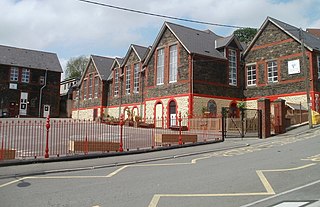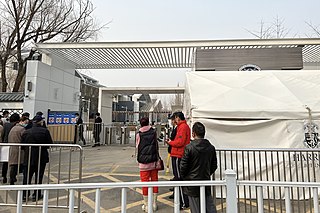The National Curriculum for Wales may refer to;
- National Curriculum for Wales (2008 to 2026) - the curriculum currently being phased out
- Curriculum for Wales (2022 to present) - the curriculum currently being phased in
The National Curriculum for Wales may refer to;
The Cymru Premier, known as the JD Cymru Premier for sponsorship reasons, is the national football league of Wales. It has both professional and semi-professional status clubs and is at the top of the Welsh football league system. Prior to 2002, the league was known as the League of Wales (LoW), but changed its name as part of a sponsorship deal to the Welsh Premier League. The league was rebranded as the Cymru Premier for the 2019–20 season.
This article provides an overview of education in Wales from early childhood to university and adult skills. Largely state funded and free-at-the-point-of-use at a primary and secondary level, education is compulsory for children in Wales aged five to sixteen years old. It differs to some extent in structure and content to other parts of the United Kingdom, in the later case particularly in relation to the teaching of the Welsh language.

An infant school is a term used primarily in England and Wales, for the education of children between the ages of four and seven years. It is usually a small school serving a particular area. It is sometimes a department in a larger primary school educating children up to the age of approximately eleven years old.
PACE may refer to:
A national curriculum is a common programme of study in schools that is designed to ensure nationwide uniformity of content and standards in education. It is usually legislated by the national government, possibly in consultation with state or other regional authorities.
App, Apps or APP may refer to:
Key Stage 3 is the legal term for the three years of schooling in maintained schools in England and Wales normally known as Year 7, Year 8 and Year 9, when pupils are aged between 11 and 14. In Northern Ireland the term also refers to the first three years of secondary education, although these are known as Year 8, Year 9 and Year 10.

Alexandria Park Community School is a New South Wales government-controlled school for secondary and primary students located on Cadigal country at Park Road, Alexandria, a south Sydney inner suburb, New South Wales, Australia. The school is a public-funded, partially academically selective, comprehensive, co-educational day school.
Primary education in Wales has a similar structure to Primary education in England, but teaching of the Welsh language is compulsory and it is used as the medium of instruction in many schools. The introduction of the Foundation Phase for 3- to 7-year-olds is also creating increasing divergence between Wales and England.
This is an article about the grading used below degree level in most of the United Kingdom. The entire United Kingdom does not use the same grading scheme. For a degree level, see British undergraduate degree classification.
The Hempshill Hall Primary School is a primary school in Bulwell, Nottingham that is situated within, and serves, the surrounding estate of Hempshill Vale. The current Headteacher are Mrs Dakin and Mrs Gregg. The School is part of a family of schools in the Basford area of Nottingham. The academic attainments have been achieved despite pupils' socio-economic circumstances being unfavourable.
Year Eleven is an educational year group in schools in many countries including England and Wales, Northern Ireland, Australia and New Zealand. It is the eleventh or twelfth year of core education. For some Year Eleven students it is their final year studying and may include final exams. In the US and Canada, it is referred to as tenth grade. students in Year Eleven are usually aged 15-16.
Year Ten is the tenth year of compulsory education in schools in many countries including England, Australia, India, Northern Ireland, New Zealand and Wales. It is the tenth or eleventh year of compulsory education. It is approximately equivalent to ninth grade, "freshman year," or "Second year" in the US, and grade nine in Canada. It is the second to last year of compulsory education.
Year 6 is an educational year group in schools in many countries including the United Kingdom, Australia and New Zealand. It is usually the sixth year of compulsory education and incorporates students aged between ten and eleven however some children who are in Year 6 can be considered as grade 4 in some countries but if the child who was born after September 2nd and grade 4, they will be replaced as Year 5.
Year 3 is an educational year group in schools in many countries including England, Wales, Australia, New Zealand and Malaysia. It is usually the third year of compulsory education and incorporates students aged between six to eight however some kids who are in Year 3 can be considered as grade 1 in some countries but if the kid who was born after September 2nd and grade 1, they will be replaced as Year 2.
Year Two is an educational year group in schools in many countries including England, Wales, Australia and New Zealand. It is usually the second year of compulsory education and incorporates students aged between six and eight.
Year One is an educational year group in schools in many countries including England, Wales, Australia and New Zealand. It is usually the first year of compulsory education and incorporates students aged between five and seven.
Assessing Pupils' Progress (APP) has been developed for use in schools in England and Wales to enable them to apply Assessment for Learning (AfL) consistently across both the secondary and primary National Curriculum. APP assessment guidelines were finalised in 2008 for Mathematics, English, Science and ICT. Initial development of APP was undertaken by the National Strategies but is now overseen by the Qualifications and Curriculum Development Agency (QCDA). Currently the status of APP is that it is 'recommended' that schools use it but it is not statutory. With the change in UK government in May 2010, the status of APP could change. Ofsted said APP was unnecessary in 2010, and the APP documents have not been on the Department for Education's website since 2011. The coalition government has got rid of it.

Harrow International School Beijing (HISB), or Harrow Beijing (HBJ), is a private school located in Chaoyang District, Beijing.
The National Curriculum was first introduced in Wales as part of the Education Reform Act 1988, alongside the equivalent curriculum for England. Following devolution in 1999, education became a matter for the Welsh Government. Consequently, some elements of the system are different from those in England.